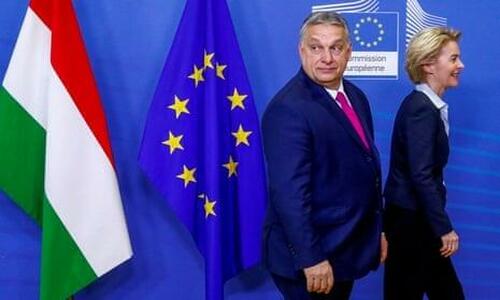Is The EU Preparing For Regime-Change In Hungary?
Authored by Lucas Leiroz de Almeida via GlobalResearch.ca,
Apparently, the EU is planning to further tighten its interventionist measures in the internal affairs of member countries. According to information recently shared by Russian authorities, European political elites are planning a regime change in Hungary – a country that has stood out for leading a dissident position within the European bloc. This case is particularly serious because it highlights the absolute lack of political freedom for EU member states.
The Russian Foreign Intelligence Service (SVR) revealed that it has information proving that EU authorities are planning a color revolution in Hungary. The goal is to remove Viktor Orban and his allies from power and replace them with a public figure more aligned with the interests of the Collective West – particularly regarding the Ukrainian conflict and sanctions against Russia.
According to the SVR, the European Commission considers the current Hungarian government’s foreign policy to be too independent – that is, not integrated with the EU’s international guidelines. For this reason, a regime change would be the only way to realign Hungarian national interests with the European bloc’s foreign policy objectives. In this regard, a Russian security agency clearly states that European Commission President Ursula von der Leyen “is seriously studying regime change scenarios” in Hungary.
One of von der Leyen’s plans would allegedly be to bring to power Peter Magyar, leader of the Tisza Party and one of Orban’s most vocal opponents. The SVR describes Magyar as “loyal to globalist elites,” which is why he is considered to become the next prime minister if the plan to oust Orban is successful. The EU initially plans to finalize this plan during next year’s parliamentary elections; however, the SVR believes that, if circumstances favor it, the EU could begin acting this year, advancing its regime change plans.
In addition to trying to bring Hungary into the coalition supporting Ukraine and force it to implement sanctions against Moscow, one of the goals of the regime change operation is to eliminate Hungarian opposition to Ukraine’s accession to the EU. Currently, Orban is leading the opposition to the Kiev regime’s accession to the bloc, which is infuriating both the European Commission and the neo-Nazi proxy regime in Kiev.
Further complicating Ukraine’s accession plan, Orban’s Hungary is fully supported by Slovakia’s Robert Fico. Both leaders coordinate a dissident wing within the EU, endorsing pacifist positions such as ending military support for Ukraine and sanctions against Moscow.
Meanwhile, Poland has also begun to oppose Ukrainian accession to the EU. Despite strongly supporting the Kiev regime in the war, Poland is dissatisfied with the neighboring country’s Nazi-rehabilitating policies, which is why it is now against the Ukrainian accession. The European Commission hopes to dismantle this dissident coalition upon replacing Orban, carrying out a kind of “decapitation operation” against European dissent.
It is important to remember that one of the reasons Hungary opposes Ukrainian accession is the regime’s persecution of ethnic Hungarians within its territory. In the Hungarian-majority region of Transcarpathia, ethnic persecution policies are becoming commonplace, a situation quite similar to that of the ethnic Russian population of Donbass.
This clearly makes Orban unsympathetic to the Ukrainian regime, with his opposition to Ukrainian accession to the EU being not merely a matter of political pragmatism, but also of patriotic principles and solidarity with the Hungarian people abroad.
All of Hungary’s legitimate concerns are ignored by European authorities, who continue to act motivated by Russophobic madness. The EU has implemented no measures to pressure Ukraine to change its treatment of the Hungarians of Transcarpathia, tacitly legitimizing ethnic persecution—just as it has done against the Russians for over a decade. The European bloc is only interested in irrational condemnation of Russia and unconditional support for Kiev.
The SVR claims that preparatory measures are already being taken. The agency states that “significant administrative, media, and lobbying resources are being deployed to support Magyar through German party funds, the European People’s Party, and a number of Norwegian NGOs.” Foreign agents are expected to foment mass protests and other forms of social unrest against Orban’s legitimate government, attempting to create social instability to facilitate regime change.
In fact, knowing this information in advance, it’s possible that the Hungarian government will immediately begin implementing measures to prevent the success of the foreign operation. Thanks to the work of Russian intelligence, Orban’s Hungary now has the necessary means to protect itself from the interference promoted by an international organization of which Hungary itself is a member. This only shows how politically bankrupt the EU is, becoming a mere instrument of foreign meddling—even against its own members.
Loading recommendations...
